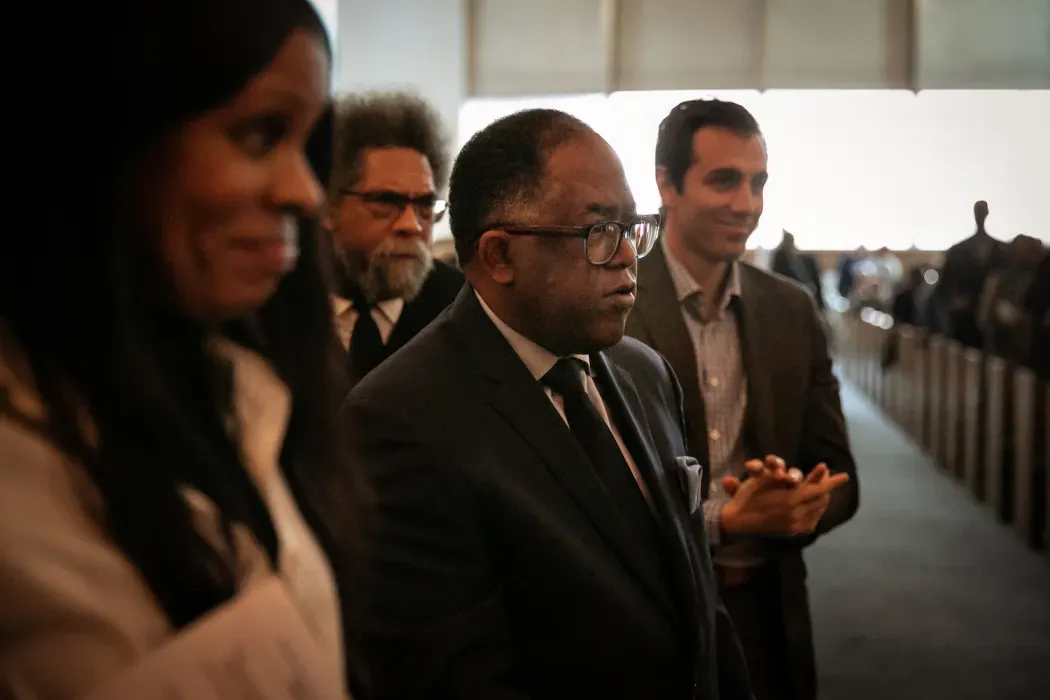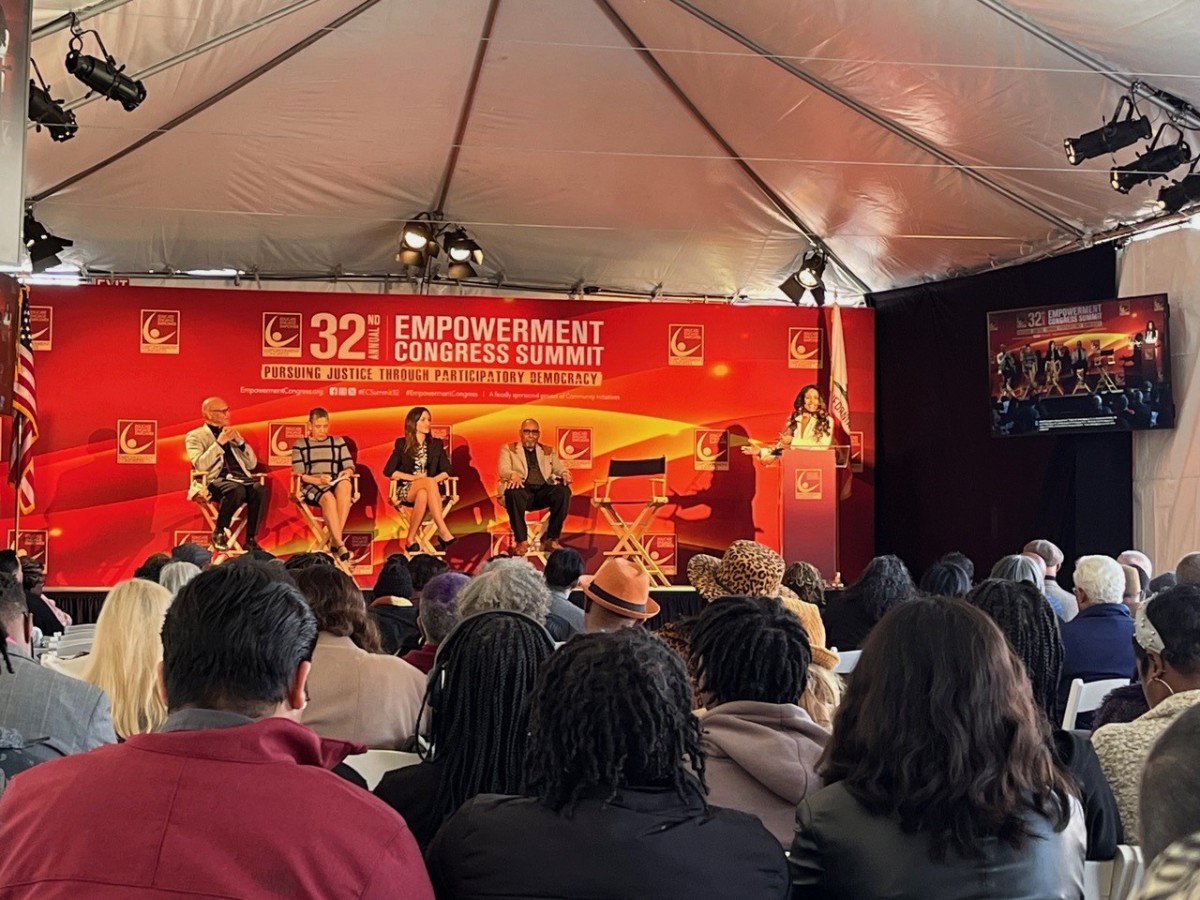LA Mag: Mark Ridley-Thomas Begins Appeal With an 'Army' of Supporters Standing Behind Him

Regarding Politics Column: A legal showdown begins as the longtime politician seeks to overturn his federal conviction
JON REGARDIE | 1 HOUR AGO
One of the most striking elements in the federal trial of Los Angeles political veteran Mark Ridley-Thomas was the crowd that each day thronged the seventh-floor courtroom of United States District Judge Dale S. Fischer. During the proceedings last March I described the turnout as an “army” of supporters. After the verdict was delivered, when the sentence was handed down in August, the courtroom was again jammed with arrive-early-to-get-a-seat backers. Tears flowed in the gallery as Fischer sentenced him to 42 months in prison.
On Thursday, the next stage began, with a new team of powerhouse attorneys filing the first documents in Ridley-Thomas’ appeal. The lengthy “opening brief,” as it’s called, cites multiple grounds to chuck the convictions or grant a new trial, including that the U.S. Attorney misapplied the law, and that errors in jury selection hampered Ridley-Thomas’ ability to obtain a fair trial.
But even before the appeal began, the army was out in force. And they were angry.
On Jan. 13, hundreds of people filled a white tent erected on the lawn of the Charles R. Drew University of Medicine and Science in Willowbrook, where the 32nd Empowerment Congress Summit took place (Ridley-Thomas helped found the Empowerment Congress, often cited as a precursor of the Neighborhood Council system). After a debate with seven candidates for District Attorney came a “teach-in” on the investigation and prosecution.

It was a striking event: part panel discussion to encapsulate and contextualize a years-long legal battle for the three-decade councilmember, county supervisor and state legislator; and part pep rally to reignite community support.
During the trial, prosecutors laid out their case that Ridley-Thomas conspired with then-USC School of Social Work Dean Marilyn Flynn to give the pol’s son, former State Assemblyman Sebastian Ridley-Thomas, admission to the university, a scholarship and a teaching position. In return, prosecutors claimed, Ridley-Thomas agreed to direct lucrative county contracts to Flynn’s financially embattled school (Flynn pleaded guilty to one count of bribery but did not testify at Ridley-Thomas’ trial). At the center of the proceeding was $100,000 that flowed from a Ridley-Thomas campaign account through the university and to a nonprofit the younger Ridley-Thomas would run.
Mark Ridley-Thomas was acquitted of 12 charges, but the jury found him guilty of seven others: conspiracy, bribery and five counts of honest-services fraud. The teach-in, said Empowerment Congress Project Director Vincent Harris, examined a situation “where the justice system may not have been as just as we want it to be.”
The audience was all-in with Ridley-Thomas, who since the 1990s had his hand in creating everything from parks to mass-transit projects to even Staples Center (now Crypto.com Arena). Not far from the teach-in was perhaps his most significant accomplishment: the Martin Luther King Jr. Medical Center, a hospital and health campus that Ridley-Thomas breathed into life after a previous institution, so rundown it became known as “Killer King,” was shuttered in 2007. The new facility has been a vital resource in a Brown and Black portion of Los Angeles that doesn’t traditionally see these kinds of projects. So whereas some Angelenos viewed the legal proceedings as another example of audacious political corruption, supporters witnessed one of their most ardent and effective advocates being taken down.
There were complaints aplenty at the teach-in, with vitriol directed at federal investigators and trial coverage by the mainstream media. It was pointed out that, despite the movement of money, no one with the last name Ridley-Thomas made even a dollar from the proceedings, as the $100,000 was intended to pay staff at the new nonprofit. There were suggestions that the entire process was politically motivated.
“They had no case. They used racial innuendo, stereotypes, sensational statements to the jury, inaccurate press releases,” said criminal defense and civil lawyer Mansfield Collins (who was not part of the defense team). “If you look at the context, of when these charges were considered and when the investigation took place, it really looks as if he was specifically targeted because he was an effective Black leader in this community.”
The applause was thunderous.
Of course, that kind of sentiment won’t play with judges on the Ninth Circuit Court of Appeals. Nor will those arguments flow unchallenged. The Los Angeles branch of the U.S. Department of Justice is stacked with experienced attorneys. They had an A-team at last year’s trial, and have no intention of losing on appeal.
Ridley-Thomas faces an uphill battle — few people take on the Feds and win. But his team too is loaded; it includes Erwin Chemerinsky, the Dean of the UC Berkeley School of Law, and Paul Watford, who just returned to the private sector after 11 years as a judge on the Ninth Circuit. They know the landscape.
The opening brief presents multiple arguments, claiming both Fischer and the government made serious missteps. One assertion is that prosecutors utilized a theory of bribery that would hamper many standard political practices. Another is that prosecutors used pre-empty challenges to exclude two Black women from the jury, imperiling Ridley-Thomas’ chance to obtain a fair trial.
At the teach-in, Alyssa Bell, who is also part of the appeal team, already seemed to brace for the blowback. “The government will have 60 days to put together their response,” Bell said, “and when they do, it will be vicious.”
The goal, said Bell, is for an expedited process that will result in arguments in front of a trio of Ninth Court justices in the late summer or fall. Their ruling could take months. In other words, there is a long road, and we won’t know soon whether it ends in prison, a new trial or an outright reversal of the convictions.

